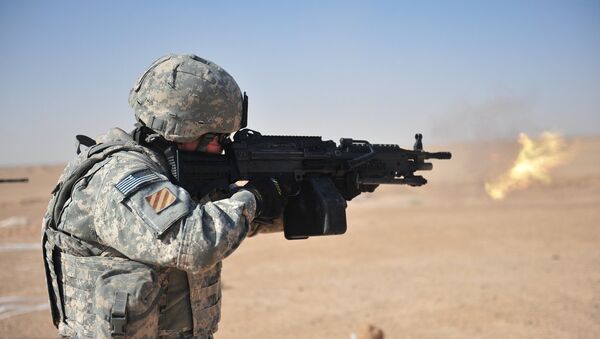All of this occurs in the context of the new ‘surge’ underway in Iraq. The US and its anti-ISIL coalition allies are streaming their forces into the country ostensibly to train, arm, and advise the Iraqi Army and Peshmerga for their future counter-offensive sometime next year. Although not stated which countries will send their troops, Jordan had offered to do so in the past, and it’s likely that the most active members of the coalition thus far (the Gulf States, Australia, Canada, France, and the UK) will also contribute.
While in the short-term this may seem fine and dandy in order to battle ISIL, it raises questions about what forthcoming role these forces will play in a post-war Iraq that’s clearly divided along geographic, ethnic, and sectarian lines. The rapid and coordinated influx of foreign coalition forces into the warzone might also create a precedent for the new ‘Global War On Terror’ that the Obama Administration plans to wage in the coming years.
Getting Three Out Of One
The Kurdish Compromise:
The formerly stable Iraq is now the most fragile state in the Mideast, unified in name only. The Kurds have carved out their ‘autonomous’ government which functions much like an independent state (albeit heavily US-influenced), complete with their own army. They even sealed a deal with Baghdad last week in which the central government basically bribed them to stay within the country, offering to give them 17% of the state’s budget, pay for their Peshmerga, and grant them de-facto control of occupied Kirkuk in exchange for oil.
The Sunni Strategy:
Kurdish Deputy Prime Minister Qubad Talabani recently said that autonomy must go further than his region, though, even proposing that it be granted to the Sunnis in Western Iraq. Concurrently, that group has now begun to call for its own tribal army (which the US plans on arming) supposedly to fight against ISIL. They may, however, be positioning themselves to team up with the Kurds after the conflict in order to take on the central government to pursue de-facto or de-jure independence. It would be extremely difficult for a ‘central army’ to take on two simultaneously rebelling autonomous ones after the war, especially when it will likely have been stretched to the limit and dispersed haphazardly all throughout the former conflict zone.
The Shia Safeguard:
As a proactive response, it’s expected that the Shiite majority in Southern Iraq will soon have a pro-autonomy reaction and attempt to get on a semi-equal footing with their Kurdish and Sunni compatriots. After all, it would be to their strategic disadvantage to be the only group left without their own military, especially as ‘unified’ Iraq crumbles before their eyes, and it’s in their best interests to hedge their bets and create their own forces just in case. Should Iraq end up with three separate militaries, each divided along ethnic and sectarian lines over specific geographic spaces, the ‘Iraqi Army’ will effectively cease to exist, and political ‘decentralization’ (or rather, disintegration) will thus commence.
That much is all but certain, but what is less so is the extent and side to which foreign forces will commit themselves to this process and for which long-term aims they’ll pursue.
Libya As The Next Coalition Conflict
Once they’re done with Iraq (or even beforehand, depending on how the war progresses and what crises may come up), the anti-ISIL coalition will likely set its sights on Libya, the next three-for-one state. The country has been split into three de-facto independent regions ever since the 2011 NATO war, much as Iraq has been since 2003, and with a similar forecast of separatism after their internal conflict ends. The regions of Tripolitania, Cyrenaica, and Fezzan are largely independent from one another, and the terrorist wars between the first two have created fertile ground for an ISIL affiliate there to rise to power.
This threat hasn’t gone unnoticed and is said to have been the catalyst for the emerging Mideast security alliance between Egypt, Saudi Arabia, Kuwait, and the UAE, with the latter three already being members of the anti-ISIL coalition.
America To ‘Save The Day’
And here’s where the US comes in. Kerry is requesting Congress to authorize military force against ISIL for a lengthy three-year period. Even more critically, he’s now lobbying for them to remove any limitations on the geographic scope of this mandate (moving it past Iraq and possibly Syria) and allowing for the possible use of ground troops. This is a far cry from Obama’s promises to not commit any ground forces to this war.
With North Africa now in the crosshairs because of ISIL, it seems that Kerry’s concern is to legitimize another war in Libya via Congress (unlike the last time), and to possibly commit ground forces to retaking control of Africa’s largest oil reserves. Any future US military action in the country will be carried out under the anti-ISIL banner, just as the operations in Iraq and Syria are today, despite the plethora of ulterior geostrategic and energy-related motives.
And once Libya’s done with, the US could predictably move on to another country where ISIL ‘just happens’ to appear (perhaps Yemen?), since Obama will have the domestic authorization to do so for three years, during which any pretext can occur, and anywhere in the world that the Pentagon points out.




